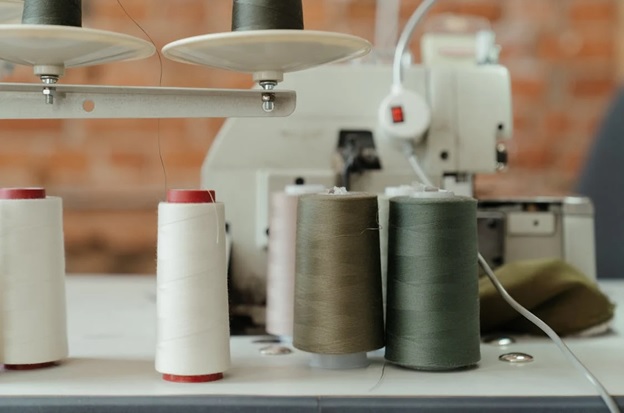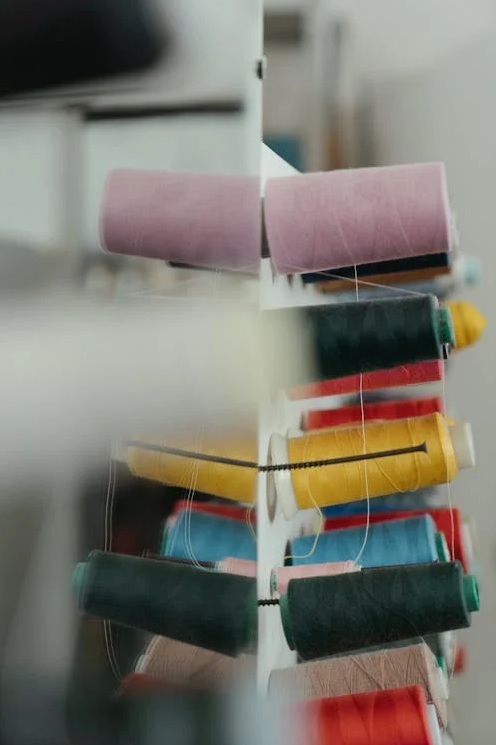Quilting Threads: Choosing the Right One for Your Project
24th Oct 2024
If you ask any quilt hobbyist or enthusiast what truly affects the quality and appearance of any quilting project, it’s very likely they will say, “Threads!”
Quilting is an art form that requires not only creativity but also the right materials to achieve perfect results. Threads are the most basic and essential material for any sewing, stitching, and quilting project, and many quilters know that switching to a particular quilting thread can make a big difference.
No matter whether you use a quilting machine, sewing machine, or hand quilting, you know there’s a specific thread that would be ideal for your project, and understanding the different types of quilting threads is crucial.
Thread Choice Matters
Choosing the right quilting thread may seem like a simple task, but it’s a decision that can affect the durability, appearance, and feel of your quilt. Quilting threads come in various types, materials, weights, and thicknesses, and each has a specific purpose. To create the best quilt, you need to understand which thread works best for your project.
Thread choice isn't just about color. The strength, texture, and type of thread play a significant role in how your quilt will look and last over time. If the thread is too weak or unsuitable for the fabric, it can break or fray, leading to a less durable quilt. On the other hand, using the wrong thread can lead to puckering or uneven stitches.
Thread weight is an essential factor in quilting. A thicker thread will create more visible stitches, while a thinner thread will be subtler. Quilting threads typically range from 28 weight (thicker) to 60 weight (finer), and the right weight depends on the look you want to achieve.
When choosing a thread, consider the fabric type, the desired stitch visibility, and the quilt’s function. For example, if you’re making a quilt for daily use, polyester or cotton would be the best choices for durability. If you're creating an heirloom quilt, silk or cotton may be the ideal option for their fine appearance.
Types of Quilting Threads
There are several types of quilting threads, each suited to specific needs and fabric types. The most common types are cotton, polyester, nylon, silk, and rayon. Let's explore the unique features of each type.
Cotton Quilting Thread: Classic and Reliable
Cotton threads are a favorite among quilters. They're made from natural fibers, which makes them soft and breathable. Cotton threads usually have a matte finish and come in a wide range of colors.
Cotton thread is perfect for quilting fabrics like cotton or linen. It's excellent for both hand quilting and machine quilting, offering a smooth, even stitch. Cotton threads have different weights, and you need to choose specific threads for specific projects.
- 40 weight cotton thread
This is used for cross stitching, machine applique, embroidery and longarm quilting. This thread is strong enough to endure fast and dense stitches, but is delicate enough to create intricate designs and detail.
- 50 weight thread
You can use this quilting thread for machine quilting, whole and micro cloth quilting, and basting. This is the most popular quilting thread for many hobbyists, as it is easy to use for both beginners and experts.
- 28 weight thread
Use this thread for cross stitching, blanket stitching, machine quilting and embroidery. This is the ideal thread weight for machine quilting, as it allows for the stitching to be defined clearly. It adds to the appearance of the completed project, which can give your fabric that extra appeal.
- 80 weight quilting thread
This thread is mainly used for paper piecing, hand appliques, free motion quilting, and machine embroidery. This thread is a delicate choice if used in piecing and applique, and when used in machine quilting, could produce detailed results.
Monofilament Threads
These threads are made from a filament of polyester or nylon. They have a single strand of fiber that is used to make a regular quilting thread. These threads could also come in different weights, so consider which one is suitable for you.
- Polyester Quilting Thread
Polyester thread is durable and strong. It has some stretch, which makes it more forgiving than cotton. Polyester thread often has a slight sheen, giving your quilt a polished look.
This thread works well with both synthetic and natural fabrics. It's a great choice for machine quilting, as it glides smoothly through the fabric.
- Nylon Quilting Thread
Nylon is a synthetic thread known for its lightweight and flexibility. It’s nearly invisible, making it a popular choice for quilting when you don’t want the thread to be noticeable.
Nylon thread is commonly used in quilting projects where the focus is on the fabric or design, rather than the stitches. It's also great for working with delicate fabrics.
Rayon Quilting Thread: Shiny and Decorative
Rayon is another synthetic thread, known for its high sheen. It's less durable than polyester or cotton but offers a striking appearance due to its shine.
Rayon is often used for decorative quilting. It’s perfect for adding visual interest and texture to your quilt, especially when using a sewing machine for embellishments.
Silk Quilting Thread: Luxurious and Smooth
Silk threads are known for their luxurious feel and smooth finish. They're incredibly strong despite their fine appearance and are often used for high-end quilting projects.
Silk thread works best for hand quilting, embroidery, or when you're working with fine, delicate fabrics like silk or satin.

Choose the Right Thread at Premier Stitching
Knowing the right quilting thread to use is one of the most important steps in a quilting project. It can affect how you use your machine, the difficulty of the application, and the overall appearance of your completed material.
Premier Stitching has different weights, materials, and brands you could choose from. You can choose threads that are compatible with your fabric, so you know that the material and thread will go together.
For quilters, the thread they choose can make all the difference. Whether using cotton for its classic feel, polyester for durability, or silk for luxury, understanding the characteristics of different threads will help you make the best choice for your quilting project.




